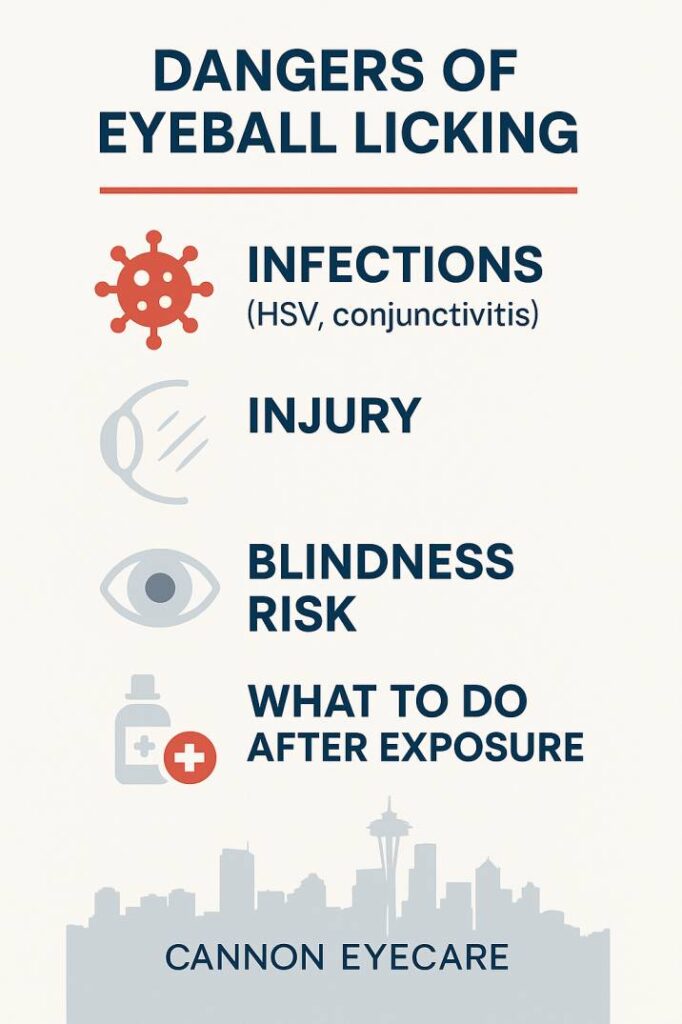Eyeball Licking in Teens: Seattle Health Alert
Eyeball licking, or oculolinctus, may sound like a viral hoax—but it’s a real behavior with serious eye health consequences. Discover the risks, science, and how to protect your vision.
Key Takeaways
-
Eyeball licking (oculolinctus) is real—but rare: Though often exaggerated online, documented medical cases confirm serious eye infections linked to the practice.
-
Severe eye health risks include conjunctivitis, herpes transmission, corneal ulcers, and even permanent vision loss from untreated infections.
-
Tongue-to-eye contact introduces harmful microbes: Oral bacteria and viruses can easily enter the eye through microscopic abrasions.
-
Seattle doctors warn of rising curiosity: While no local cases have been reported, inquiries from teens and parents in Capitol Hill and Bellevue are increasing.
-
Immediate response matters: Rinse the eye, avoid rubbing, monitor symptoms, and seek urgent care—preferably from specialists like Cannon EyeCare.
-
Seattle’s humid climate increases bacterial risk, making prompt treatment even more crucial.
-
Community education is key: Parents, teachers, and teens should work together to promote media literacy and debunk dangerous internet challenges.
-
Trusted sources only: Encourage teens to verify viral trends through reliable health websites or eye care professionals—not social media.
What Is Eyeball Licking (Oculolinctus)?
Eyeball licking (oculolinctus) is the act of licking someone’s eye surface, typically as a dare or intimate gesture. This risky behavior first gained notoriety on Japanese youth forums before spreading worldwide via shock-driven social media and viral videos. Platforms like Reddit and Quora now host heated debates about whether the trend is genuine or media-exaggerated.
Critical Eye Health Facts:
-
While actual participation rates are likely low, even isolated incidents pose serious eye health risks
-
Documented U.S. medical cases confirm ocular infections and corneal damage directly linked to eyeball licking
-
Seattle eye doctors note increased concerns from Washington state parents and teenagers seeking guidance
What Are the Health Risks of Eyeball Licking?
Eyeball licking poses severe dangers to eye health. Our Seattle optometrists emphasize that the eye’s delicate surface is highly vulnerable to oral bacteria and viruses.
Documented Medical Complications Include:
-
Conjunctivitis (Pink Eye): Mouth bacteria cause redness, swelling, and discharge
-
Herpes Transmission: Herpes simplex virus may spread to the eye, creating painful ulcers and permanent vision loss
-
Corneal Injuries: Tongue contact can cause scratches (abrasions) or ulcers, inviting serious ocular infections
-
STI Exposure: Chlamydia and other pathogens can transfer via saliva to the eye
-
Partial/Complete Blindness: Untreated infections may result in irreversible vision damage
Is Eyeball Licking a Real Trend or Media Hype?
Seattle parents and teens,
particularly in tech-centric areas like Capitol Hill and Bellevue, they frequently ask whether eyeball licking is an actual trend or digital folklore.
Evidence-Based Findings:
-
Viral incidents (e.g., Japan’s rumored “worm eye challenge”) were often debunked as exaggerated social media hoaxes
-
Peer-reviewed ophthalmic case studies confirm oculolinctus occurs rarely but causes documented harm when practiced
-
Seattle optometric clinics report zero local cases despite online curiosity
How Eyeball Licking Triggers Eye Infections: Science Breakdown
Despite rigorous oral hygiene, all mouths harbor hundreds of bacteria and virus species. When tongue-to-eye contact occurs during oculolinctus:
Infection Pathways Explained:
-
Direct Pathogen Transfer
-
Oral microbes deposit directly onto the conjunctiva and cornea
-
-
Microscopic Corneal Injuries
-
Tongue texture creates tiny abrasions, allowing pathogens deeper access
-
High-Risk Mouth Pathogens:
-
Streptococcus and Staphylococcus bacteria
-
Herpes simplex virus (HSV-1)
-
Neisseria species (cause bacterial conjunctivitis)
-
Chlamydia trachomatis (rare but documented)
Seattle-Relevant Research Insight:
Peer-reviewed studies (American Journal of Ophthalmology) confirm oculolinctus directly causes:
-
Corneal ulcers
-
Viral/bacterial conjunctivitis
-
Herpetic eye infections
Pacific Northwest eye specialists emphasize: Even brief contact risks permanent ocular damage.
Emergency Response: What to Do After Eyeball Licking Exposure
If you or your child experiences eyeball licking contact, follow these critical steps immediately:
-
Flush the Eye
-
Rinse gently with sterile saline solution or clean lukewarm water for 5+ minutes.
-
-
Avoid Touching or Rubbing
-
Pressure can deepen corneal abrasions
-
-
Track Symptoms
-
Watch for redness, swelling, discharge, pain, light sensitivity, or vision changes.
-
-
Seek Urgent Professional Care
-
Contact Cannon EyeCare in Seattle or your nearest eye clinic for a same-day evaluation—even without symptoms
-
Why Seattle-Specific Action Matters:
Washington’s humid climate may accelerate bacterial growth. Our Seattle emergency eye care team provides:
-
Pathogen-specific treatment
-
Corneal injury assessment
-
Prevention guidance for families
Preventing Risky Eye Trends: A Seattle Community Guide
Washington parents, educators, and teens can combat dangerous viral challenges like eyeball licking through proactive collaboration:
For Seattle/King County Parents:
-
Host judgment-free talks about online trends during family time
-
Emphasize permanent vision damage risks – not just temporary “gross” factors
-
Teach media literacy: “If a trend seems extreme, it’s likely exaggerated or dangerous.”
For Puget Sound Area Teachers:
-
Monitor student discussions for emerging dares (e.g., Slack channels, in-person chatter)
-
Partner with Cannon EyeCare for free school workshops on ocular safety and digital awareness
-
Display Seattle Children’s Hospital resources on science-backed trend risks
For Washington Teens:
-
“Your vision is irreplaceable – no 5-second viral fame is worth corneal scarring“
-
Verify trends via .gov sites or Seattle optometrists – not social media comments
-
Report dangerous dares to trusted adults or King County health hotlines
While eyeball licking might seem like a bizarre or exaggerated trend, its medical consequences are very real. From corneal abrasions to serious infections like herpes and bacterial conjunctivitis, even one incident of oculolinctus can result in permanent vision damage. Seattle families, especially in tech-forward communities, must stay vigilant, informed, and proactive in addressing such viral dares before harm occurs.
If you or someone you know has been exposed to eyeball licking—even as a joke—don’t wait for symptoms to appear.
Contact Cannon EyeCare in Seattle immediately for a same-day eye health evaluation. And for parents and educators: start open conversations, share this guide, and help teens understand that their vision is far more valuable than viral fame
FAQs
-
Eyeball licking, or oculolinctus, involves touching the eye with the tongue—usually as a dare, fetish, or show of affection.




